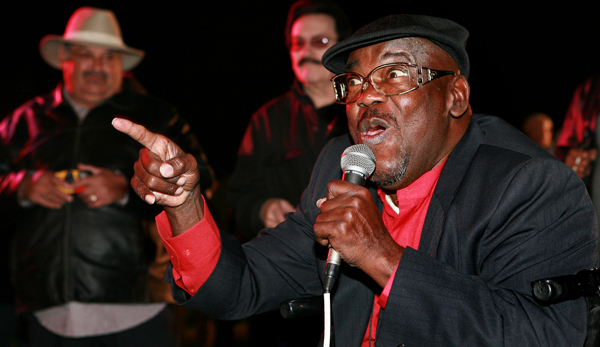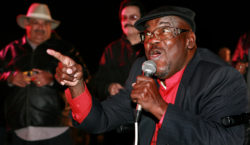Clarence “Frogman” Henry
Louisiana singer and pianist Clarence "Frogman" Henry Jr., will forever be identified with the 1956 novelty rhythm & blues classic "Ain't Got No Home."

Courtesy of Gary LoVerde
Clarence "Frogman" Henry performing at the Cabildo in 2010. LoVerde, Gary (Photographer)
Louisiana singer and pianist Clarence “Frogman” Henry Jr., will forever be identified with the 1956 novelty rhythm and blues classic “Ain’t Got No Home.” In that song, Henry sings in a normal voice, then in a girlish falsetto, and finally in a froglike croak. Henry had two other major hits and a few minor ones during his long musical career. In February 2003, the Rhythm and Blues Foundation awarded him its Pioneer Award, and he was inducted into the Louisiana Music Hall of Fame in April 2007.
Early years
Clarence Henry Jr., was born March 19, 1937, in New Orleans, the son of Clarence Henry, an L&N railroad porter, and his wife Ernestine. One of six children, Henry accompanied his sister, Lizzie, to classical piano lessons; when she lost interest, his mother agreed to send him instead. In 1948, the Henry family moved from the Seventh Ward to the Algiers neighborhood on the West Bank of the Mississippi River.
Henry’s main musical influences were both pianists—Fats Domino and Henry Roeland “Professor Longhair” Byrd. While in high school, Henry entertained fellow students at a talent show by braiding a wig to play the part of his idol, Professor Longhair. He would sneak into clubs to hear Longhair and other R&B musicians, and later joined his classmate Bobby Mitchell’s band, the Toppers, with whom he remained until 1955.
“Ain’t Got No Home”
Henry began playing solo in West Bank clubs like the Fatman and the Chicken Shack. One club owner connected him with saxophonist Eddie Smith, in whose band Henry improvised the basic structure of “Ain’t Got No Home.” As the story goes, it was after 2:00 a.m. and the band had run out of songs, but the owner implored them to keep playing. Needing to get up early for school the next morning, Henry reluctantly played a blues pattern on piano and began making up words: “You ain’t got no home, or place to roam.” Then he began croaking like a frog and the audience loved it.
Realizing that he might be onto something, Henry approached local bandleader and pianist Paul Gayten, who also served as the local artists repertoire man for Chess Records in Chicago, Illinois. The New Orleans sound was very popular in the early 1950s, and label owner Leonard Chess wanted in on the action, so he flew down to hear Henry and his new song. Chess signed the young singer and pianist, and advised Gayten to break up the song into different sections to showcase Henry’s multiple voices.
Henry claims he first developed his “frog voice” to scare the girls at his school. His falsetto was a direct result of the popularity of the duet act Shirley & Lee, and enabled Henry to perform their material even though he didn’t have a female singer. In September 1956, Gayten took Henry to local producer Cosimo Matassa’s studio to cut “Ain’t Got No Home,” which was released on the Chess subsidiary label, Argo. “Troubles, Troubles,” a bouncy but lyrically bleak tune, was the A-side but received little radio response. Then Clarence Hayman (also spelled Hamann), one of a number of New Orleans R&B DJs, who went by the moniker “Poppa Stoppa,” flipped the record over and played the B-side, and the audience response was immediate. Not knowing the artist’s name or the song title, listeners would call the station and ask for “the frog song, by the frogman,” earning Henry the “Frogman” nickname. The song reached number three on the R&B charts and number twenty on the pop charts, leading to Henry’s participation on revue-style tours with other early rock & roll performers.
Tours and Later Singles
Henry recorded additional singles for Chess, including the inevitable follow-up, 1957’s “I Found a Home.” None were successful, perhaps because “Ain’t Got No Home” pegged him as a novelty artist. During this period Henry toured outside the United States, playing concerts in England, Scotland, Germany, and New Zealand. Along with other 1950s New Orleans R&B artists, Henry was extremely popular in Jamaica and influenced the formation of ska, and later, reggae.
In 1960, Henry finally scored another hit with a tune titled “But I Do” (called by the alternate title “I Don’t Know Why” in some earlier versions), a country-flavored song featuring Dixieland horns. A young Allen Toussaint played piano and directed the arrangement. The song was co-written by Gayten and Louisiana songwriter Bobby Charles, best known for “See You Later, Alligator,” a 1956 number six hit for Bill Haley and his Comets, and “Walkin’ to New Orleans.” Henry and Charles enjoyed a fruitful creative partnership; the former’s warm vocals perfectly suited Charles’s swamp pop compositions. “But I Do” climbed to number four on the pop charts while his next single, a version of the Mills Brothers’ 1944 hit “You Always Hurt the One You Love,” reached number twelve.
During the early 1960s, Henry appeared on Dick Clark’s American Bandstand television program; he also toured extensively as part of Clark’s “Caravan of Stars.” He even toured with the Beatles, opening eighteen concerts for them on their 1964 North American tour. With Beatlemania sweeping the United States, however, the audience paid little attention to any of the opening acts. Henry recorded an album and a few more singles in the late 1960s and early 1970s, but the New Orleans R&B sound was now out of style and there would be no more hits.
Although his national popularity had faded, Henry was still remembered in New Orleans. Beginning in 1959 he played shows at a variety of French Quarter clubs in an exhausting regimen of six hours a night, six days a week. His band often featured several Fats Domino alumni. Henry continued these regular gigs for two decades, finally stopping in 1981.
Recent years
During the 1990s, conservative radio host Rush Limbaugh began using “Ain’t Got No Home” for the “Homeless Update” segment of his program. Henry made personal appearances and a video with Limbaugh. In 1991, he was temporarily paralyzed by a ruptured disc in his neck, but eventually recovered thanks to New Orleans neurosurgeon Dr. Frank Culicchia, who operated on Henry without charge. His profile was boosted again in 1994, when “But I Do” was included on the Forrest Gump soundtrack, which went on to sell eight million copies. Meanwhile, “Ain’t Got No Home” was featured in other films such as Diner, The Lost Boys, and Casino.
Like many R&B performers of his era, Henry received little or no compensation for his several hit singles. But during the 1990s, his lawyer contacted MCA Records, which now owned the Chess masters. As a result, Henry finally received some royalties for songs he had written more than thirty years before. He played the New Orleans Jazz & Heritage Festival regularly and made occasional appearances at other festivals and Gulf Coast casinos. He enjoys his status as a beloved elder statesman of New Orleans R&B and has toured and shared playbills with Tina Turner, Dr. John, Professor Longhair, James Brown, Little Richard, Bonnie Raitt, and many others. Though Hurricane Katrina damaged his home, Henry survived unscathed. He lived in the West Bank area of New Orleans in a house filled with frog memorabilia, much of it sent by fans from all over the world. He passed away on April 7, 2024, at the age of 87.
